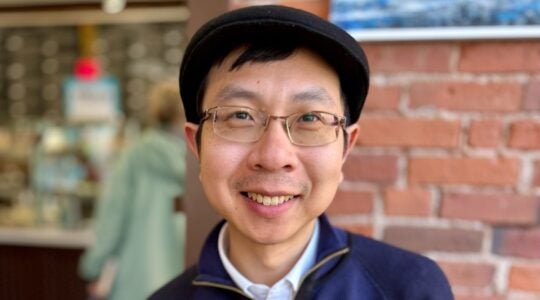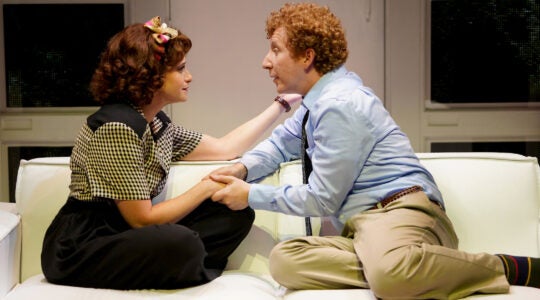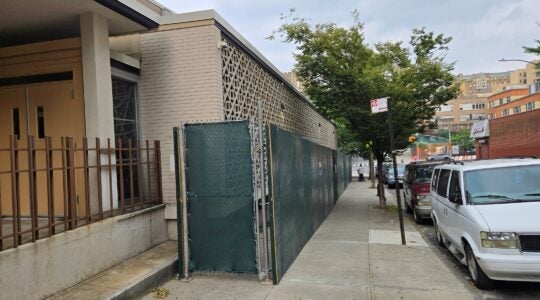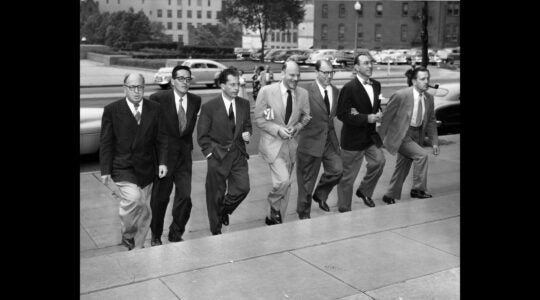On Saturday, as Hurricane Irene approached David Reichenberg’s community of upstate Spring Valley, the businessman finished studying Avodah Zara, a portion of Mishnah, with a learning partner of his. Then his chavruta and their families celebrated their accomplishment with a siyum — Hebrew for completion — meal in Mr. Reichenberg’s home.
Mr. Reichenberg and fellow learning partners had shared several such celebrations in the last few decades.
Saturday’s turned out to be his last siyum.
A longtime resident of the heavily Orthodox Monsey-Spring Valley area, Mr. Reichenberg died the next morning, in the aftermath of Irene, performing his final mitzvah.
Driving home from another learning session, he noticed a child in danger at the corner of Merrick Drive and Union Road, a tree-lined residential intersection near his home. Irene, which had struck the East Coast on Saturday night, had brought down a power line — 5-year-old Reuven David Herbst, who lives in Mr. Reichenberg’s neighborhood, accidentally came in contact with a metal fence that carried a high-voltage electrical charge from wires that lay obscured on the flooded street. Standing in curbside water, he was being badly burned and could not pull away; his father, Rabbi Yehuda Herbst, was unable to reach him.
Mr. Reichenberg, an experienced outdoorsman, jumped out of his car, waded into the water and saved the pair, being electrocuted on the spot. At 50, a father of four, he was buried that night.
Reuven Herbst, whose family after the accident gave him the additional name of Chaim (Hebrew for life) — in traditional Jewish circles, a symbolic name like Chaim, or Rafael, God is my healer, is often added to the name of an individual whose life is in danger — was in critical condition early this week in Westchester Medical Center in Valhalla. His father, who suffered burns while attempting to save his son, was earlier treated at Good Samaritan Hospital in Suffern and released.
One other Jewish person is known to have died because of the hurricane. Rozalia Gluck, a Russian-born Holocaust survivor who lived in Williamsburg, Brooklyn, drowned after being swept away by flood waters while visiting friends in the Catskills’ Valkyrian Motel.
At Mr. Reichenberg’s funeral in the crowded auditorium of Yeshiva Ohr Somayach’s retreat center in Monsey, and in the days after his death, his friends and rabbis described a man with a constant smile on his face and bounce in his step, despite “challenges” that had included financial setbacks, medical issues in his family and a late-night fire two decades ago that destroyed his rented apartment, leaving his family with nothing beyond the pajamas in which they had fled.
At morning worship services the day after the fire, wearing a borrowed three-sizes-too-large suit, he reportedly told friends that he considered that day the best one in his life. “You took everything, but You gave me my life,” his friends say he said in his prayers to God that morning. “I never felt closer to Hashem,” he said.
“He had unbelievable emunah,” says Rabbi Avraham Braun, dean of Ohr Somayach, using the Hebrew word for faith. “He was always there to help somebody.
“He was,” Rabbi Braun added, “a real all-American sweetheart of a guy. He was fun to be around.”
Mr. Reichenberg, a native of the Philadelphia area who was raised in a non-Orthodox family and attended Montreal’s McGill University and the University of Washington, took on an Orthodox lifestyle — and the Hebrew name Moshe Yosef, as his circle of friends knew him — as a young adult. He was a longtime student at Ohr Somayach, a baal teshuvah institution, attending a daily 6:15 a.m. Talmud class.
His friends this week talked about his multiple and varied interests: his perseverance in traditional Jewish learning, his daily review sessions on the phone with his daughter about the laws of forbidden speech while she was studying at a seminary in Israel, his self-taught juggling with which he entertained newly married couples at weddings, his black belt in tae kwon do, his love of hiking and camping.
“He loved the woods. He loved Hashem’s world,” said Rabbi Leibel Lam, a Monsey educator and longtime friend of Mr. Reichenberg.
“He knew the hiking trails of Harriman State Park better than the bears do,” said Zev Kowitz, a neighbor of Mr. Reichenberg.
Alan Stubin, a real estate appraiser and longtime friend of Mr. Reichenberg, said he had arranged to meet Mr. Reichenberg on a camping trip several years ago. Darkness fell and Mr. Reichenberg hadn’t appeared; he wouldn’t be there that day, Stubin and his fellow campers agreed. At midnight, Mr. Reichenberg walked into the campers’ clearing, out of the dark woods, carrying a flashlight in each hand.
“Nothing intimidated him,” Stubin said. “Nothing was too much of a challenge.”
Last week, as the hurricane neared New York State, Mr. Reichenberg took one of his sons to help put together packages for Tomchei Shabbos, which distributes free food to needy families. The need was thought likely to increase if the storm left people homebound for several days.
“He wanted to introduce his son to this kind of gemilas chesed [act of kindness],” Rabbi Braun says.
On Sunday morning, Mr. Reichenberg reacted instinctively when he saw an endangered child, Kowitz says. “He didn’t hesitate. He didn’t think about the risk. He just thought about saving a kid.”
A Reichenberg Fund to assist Mr. Reichenberg’s family has been established through Yeshiva Ohr Somayach. Contributions can be sent to Ohr Somayach/Reichenberg Fund, c/o Rabbi Yochonon Wosner, 3 Manor Drive, Monsey, NY 10952; (845) 232-0067. The website is reichenbergfund.org.
E-mail: steve@jewishweek.org
The New York Jewish Week brings you the stories behind the headlines, keeping you connected to Jewish life in New York. Help sustain the reporting you trust by donating today.




